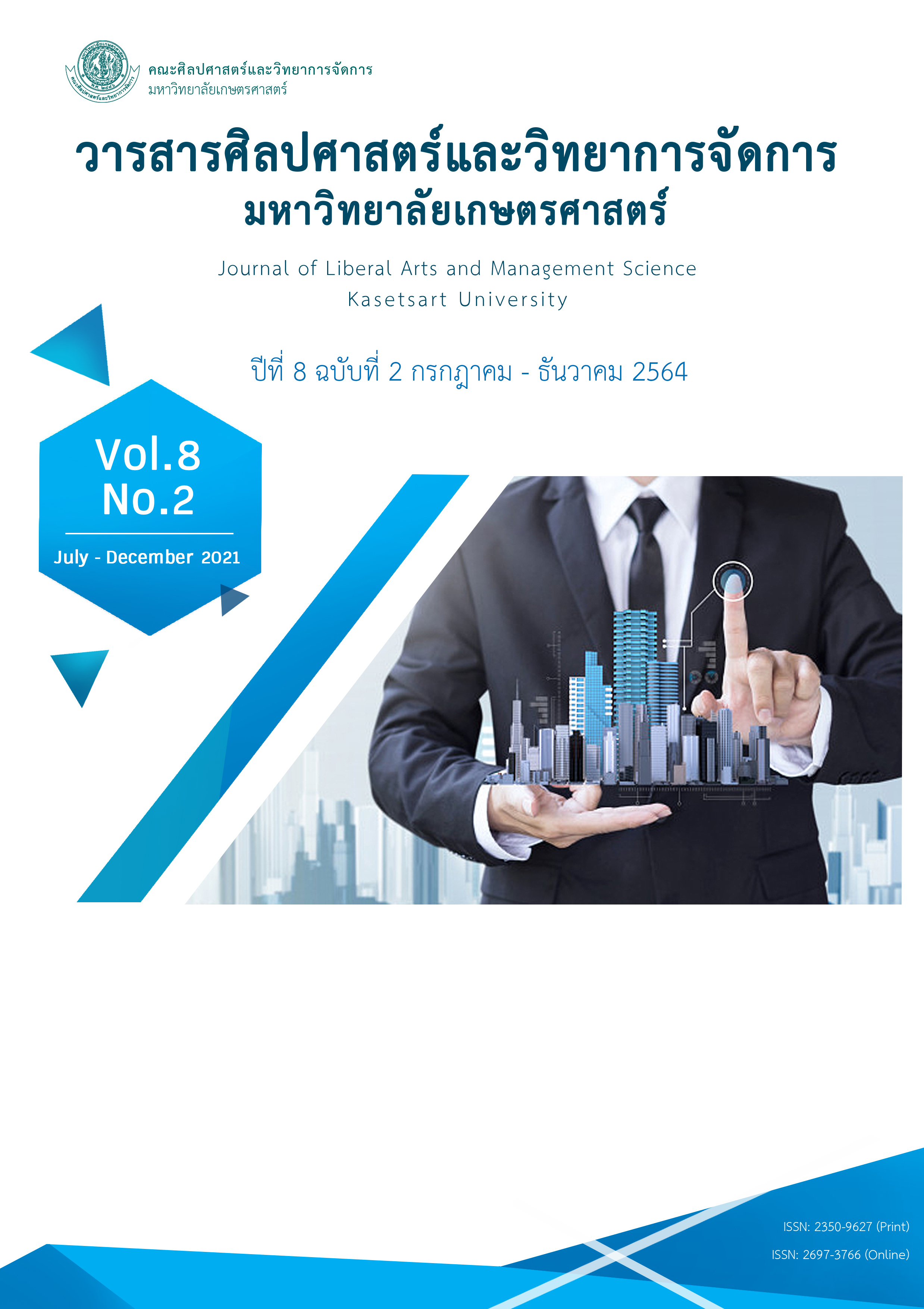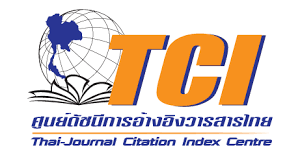CUSTOMER’S EXPECTATION OF SERVICE QUALITY, QUALITY PERCEPTION, AND LOYALTY OF USING THE INTERNATIONAL TRANSPORTATION SERVICE IN NONG KHAI PROVINCE
Keywords:
Expectation, Perception, Service Quality, Brand Loyalty, International Transportation ServiceAbstract
The purposes of this research are 1) to investigate the expectations and perceptions of the customers’ expectations of service quality, quality perceptions, and loyalty of using the international transport service in Nong Khai Province; 2) to compare the differences between the customer’s expectations and quality perceptions; 3) to study the relationship between service perceptions and repurchase and word of mouth. The sample was 400 people who use international buses in Nong Khai Province. The data was collected from the mailed questionnaire and analyzed by using percentage, mean, standard deviation, paired t-test and Pearson correlation. The results showed that, overall, the service users had service quality expectations at a high level, and perceived service quality at a moderate level. Service users had expectations of service quality differ from perceptions in every aspect at the significance level of 0.05. In addition, all aspects had expectation’s mean higher than service perception’s. That points out that the customers are not satisfied with service quality. The service quality perceptions of users in terms of service standards, staff and the facility aspect correlated with repeat service loyalty and word of mouth at the significance level of 0.05. The results of this research can be used as a guideline to improve the service quality of international bus operators in Nong Khai Province, identify customer needs from expectations to increase satisfaction and create customer loyalty leading to greater business sustainability.
References
Buakitti, V. (2007). Customer satisfaction towards air-conditioned bus services of Bangkok
Mass Transit Authority. Thesis. Chiang Mai University. (in Thai)
Bualert, P. (2014). Guidelines to Improve the Services of the Local Buses (Pothong)
Provided by the Phuket Provincial Administrative Organization (PAO). Thesis. Rajabhat
Phuket University. (in Thai)
Changsu, K., Galliers, R., Shin, N., Ryoo, J.-H., & Kim, J. (2012). Factors influencing Internet
shopping value and customer repurchase intention. Electronic Commerce Research and
Applications, 11(4), 374-387.
Chaoprasert, C. (2009). Service marketing. Bangkok: Se-Education.
Cochran, W.G. (1977). Sampling Techniques. 3rd ed. New York: John Wiley & Sons, Inc.
Cunningham, L., Young, C., & Lee, M. (2000). Methodological triangulation in measuring
public transportation service quality. Transportation Journal, 35-47.
Demirci, O. F., & Kara, A. (2014). Supermarket self-checkout service quality, customer
satisfaction, and loyalty: Empirical evidence from an emerging market. Journal of
Retailing and Consumer Services, 21(2), 118-129.
Eboli, L., & Mazzulla, G. (2008). A stated preference experiment for measuring service
quality in public transport. Transportation planning and technology, 31(5), 509-523.
Etzel, M.J. (2014). Marketing (12thed.). New York: McGraw-Hill/lrwin.
Hair, J.F., Black, W.C., Babin, B.J., & Anderson, R.E. (2010). Multivariate Data Analysis: A
Global Perspective. 7th ed. New Jersey: Pearson Prentice Hall.
Ivanauskiene, N., & Auruskevicien, V. (2009). Loyalty programs challenges in retail banking
industry. Economics & Management, 14, 407-412.
Jiewanto, A., Laurens, C., & Nelloh, L. (2012). Influence of service quality, university
image, and student satisfaction toward wom Intention: A case study on universitas pelita
harapan surabaya. Procedia - Social and Behavioral Sciences, 40, 16-23.
Kolter, P. (2010). Marketing management (The Millennium ed.). New Jersey: Prentice Hall.
Lien, C. H., & Cao, Y. (2014). Examining wechat users’ motivations, trust, attitudes, and
positive word-of-mouth: Evidence from china. Computers in Human Behavior, 41, 104-
Mohsin, A., McIntosh, A. & Cave, J. (2005). Expectations of the service experience offered
by restaurants and cafes in Hamilton. Journal of Hospitality and Tourism Management,
(2): 108-116.
Noipawong, D. (2007). Impact of the Behavior and Satisfaction of Passengers upon the
Management of Suburban Lines Operated by the State Railway of Thailand. A Thesis.
Phranakhon Si Ayutthaya Rajabhat University. (in Thai)
Oliver, R. L. (2014). Satisfaction: A behavioral perspective on the consumer: A behavioral
perspective on the consumer. Routledge.
Orel, F. D., & Kara, A. (2014). Supermarket self-checkout service quality, customer
satisfaction and loyalty: Empirical evidence from an emerging market. Journal of Retailing
and Consumer Services, 21(2), 118-129.
Pajakul, A. (2012). Evaluation of service rendering of bus terminal under the supervision
of Lampang municipality. Thesis. Chiang Mai University.
Parasuraman, A., Zeithaml, V. A., & Berry, L. L. (1990). Delivery quality service: Balancing
customer perceptions and expectation. New York: A Division of Macmilan.
Ryu, K., Han, H., & Kim, T. H. (2008). The relationships among overall quick-casual
restaurant image, perceived value, customer satisfaction, and behavioral intentions.
International Journal of Hospitality Management, 27(3), 459-469.
Sittichai, S., Khunon, S. (2015). Measuring customer loyalty for hotel industry. Executive
Journal, 35(1), 64-74.
Skogland, I., & Siguaw, J. A. (2004). Are your satisfied customers loyal. Cornell Hotel and
Restaurant Administration Quarterly, 45(3), 221-234.
Songsraboon, R. (2020). Service quality influencing the satisfaction of underground mass
rapid transit system’s passengers from Tha Phra Station to Wat Mangkon Station in
Bangkok. Journal of Educational Innovation and Research, 4(2), 135-146.
Szczepanka, K., & Gawron, P. P. (2011). Changes in approach to customer loyalty.
Contemporary Economics, 5(1), 60-69.
Tantakasem, P., & Lee, S. M. (2008). Service quality and the customer satisfaction chain in
the Thai retail banking industry. BU Academic Review, 7(1), 98-109.
Turner, R. C., & Carlson, L. (2003). Indexes of item- objective congruence for
multidimensional items. International Journal of Testing, 3(2), 163- 171.
World Travel & Tourism Council (WTTC). (2019). Travel & Tourism Economic Impact 2019
World. Retrieved April 18, 2021, from https://www.wttc.org//media/files/reports/economic-impact-research.
Zehir, C., Şahin, A., Kitapçı, H., & Özşahin, M. (2011). The effects of brand communication
and service quality in building brand loyalty through brand trust; the empirical research
on global brands. Procedia - Social and Behavioral Sciences, 24, 1218-1231.






